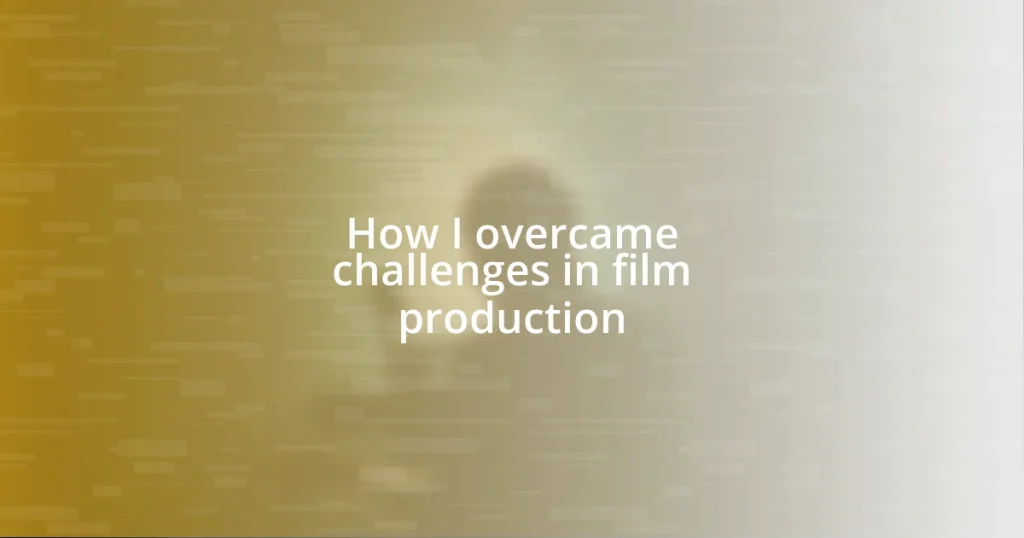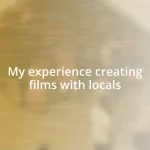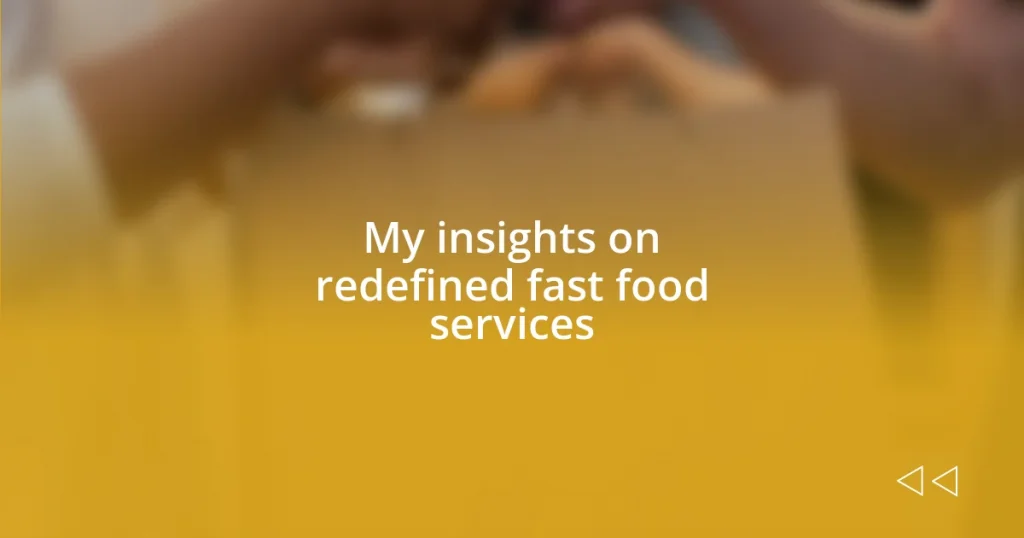Key takeaways:
- Effective communication and adaptability are crucial in film production, allowing teams to navigate challenges and maintain a collaborative environment.
- Building a supportive team through genuine connections and empowering individuals leads to enhanced creativity and problem-solving capabilities.
- Reflecting on past experiences fosters resilience and growth, helping filmmakers learn from challenges and successes for future projects.

Understanding film production challenges
Film production is an intricate dance of logistics, creativity, and sometimes chaos. I remember one shoot where we were all set to film a crucial scene, only to discover an unexpected rainstorm rolling in. In that moment, I felt a mix of frustration and determination. How could we possibly salvage our day? It was a stark reminder that external factors can throw us off balance.
Another challenge that often arises is managing interpersonal dynamics among the team. I once worked with a talented but temperamental cinematographer. His artistic vision clashed with the director’s, creating tension on set. It made me wonder, how can we harmonize such strong personalities while still keeping the project on track? I learned that open communication is key; sometimes, a simple conversation helps to bridge those emotional divides.
Budget constraints can loom large, often leading to tough decisions. I’ll never forget a project where we had to make hard choices about locations and equipment. The pressure was intense, and I felt the weight of responsibility for my team’s morale. How can we do more with less? This experience taught me the importance of innovation and adaptability; sometimes it’s in those limitations that creativity truly thrives.

Identifying personal and external obstacles
Navigating the film production landscape can feel overwhelming when you acknowledge both personal and external obstacles. Personally, I often struggle with self-doubt, especially when I face criticisms about my decisions. There was a moment on set when I questioned every choice I made during a take, worried about not meeting expectations. This internal battle made me realize that overcoming self-imposed limitations is just as crucial as tackling external challenges.
When considering external obstacles, several factors can disrupt our well-laid plans. For anyone new to film production, identifying these hurdles is essential. Here’s a quick rundown of common issues I’ve encountered:
- Weather Conditions: Sudden changes can halt a shoot unexpectedly.
- Budget Limitations: Financial constraints often force compromises on locations or equipment.
- Team Dynamics: Conflicts within the crew can affect morale and productivity.
- Equipment Malfunctions: Technical failures can lead to lost time and increased stress.
- Permits and Regulations: Navigating legal necessities can become a daunting task that slows progress.
Recognizing these obstacles has been a game-changer for me; it allows for better planning and a more resilient mindset.

Developing a problem-solving mindset
Developing a problem-solving mindset is vital in film production, where challenges can arise at any moment. I recall a day when the lead actor fell ill just hours before a major shoot. Panic threatened to set in, but I quickly realized the importance of thinking on my feet. By rapidly assembling the team, we brainstormed alternatives and even managed to adapt the script slightly to maintain our momentum. That experience underscored how a constructive mindset can turn setbacks into opportunities.
It’s fascinating how shifting our perspective can unveil solutions we hadn’t considered. I remember grappling with a last-minute location change, and instead of viewing it as a loss, I embraced it as an opportunity to improvise and rethink our approach. Embracing potential obstacles as creative challenges can be invigorating. It allows me to tap into the wellspring of ideas that emerge when I let go of rigid expectations and remain flexible.
Building this mindset is an ongoing journey. Reflecting on past experiences, I’ve found that keeping an open line of communication with the crew plays an essential role in problem-solving. During one particularly hectic shoot, sharing our worries and suggestions created a collaborative atmosphere that not only fostered trust but also led to innovative solutions. It’s incredible how working together can elevate a problem into a collective triumph.
| Mindset Aspect | Example from Experience |
|---|---|
| Adaptability | Adjusting the script during the lead actor’s illness to keep production on track |
| Creativity | Transforming a last-minute location change into an opportunity for new ideas |
| Communication | Engaging the crew in open discussions to collaboratively tackle challenges |

Strategies for effective communication
Effective communication is the backbone of any successful film production. I remember a particularly challenging day on set when the sound engineer and I had a major misunderstanding about the audio setup. Tensions were high, and I realized I had to pause, take a breath, and actively listen to his concerns. By allowing open dialogue, I fostered a space where we could both express our viewpoints, ultimately leading to a more efficient resolution. Isn’t it astounding how simple listening can transform a potentially explosive situation into a collaborative effort?
Additionally, I’ve found that clarity is key. During my early days in production, I sometimes assumed everyone understood my vision. However, I often faced confusion and frustration among the crew. I learned the hard way that providing clear and concise instructions can prevent misinterpretations. Now, I make it a habit to check in with team members to ensure they are aligned with my expectations. Have you ever worked on a project where assumptions led to chaos? I have, and it taught me that clarity can save time and resources.
Lastly, I can’t emphasize enough the importance of non-verbal communication on set. In one instance, during a tense scene, the actor’s body language suggested he was struggling to connect with the character. I noticed his unease and, rather than waiting for him to voice it, I took a moment to engage him with a reassuring nod and a quick chat about our shared vision for the scene. It’s funny how a simple look or gesture can sometimes deliver more than words. This experience reinforced my belief that effective communication transcends dialogue; it also involves emotional intelligence and empathy, which are crucial for maintaining a harmonious and productive environment in film production.

Building a supportive production team
Building a supportive production team often starts with cultivating genuine connections. I remember the first time I set foot on a film set as a director. I felt like an outsider despite knowing my craft. It was only after I took the initiative to share meals together and engage in casual conversations that the team began to open up. Suddenly, we weren’t just colleagues; we were a group of individuals committed to a shared vision. Isn’t it amazing how breaking bread can help forge bonds that translate to creative synergy?
Support goes beyond camaraderie; it’s about creating an environment where everyone feels valued. I once worked with a grip who had ideas that were invaluable, but he often hesitated to share them. After a brainstorming session, I specifically asked for his input and praised his contributions during meetings. The difference was palpable. He blossomed into a key player, offering creative solutions I hadn’t considered. Have you ever noticed how one small act of encouragement can unleash a wealth of potential?
Additionally, I’ve learned the power of trust in building a supportive team. Early in my career, I was hesitant to delegate tasks, fearing that others wouldn’t meet my standards. However, during a particularly intense shoot, I decided to hand over the editing process to my assistant, trusting her instincts. The result was not just a stellar final cut but also her sense of ownership and pride in the project. It surprised me to realize that empowering others can lead to more innovative solutions. Why do we sometimes forget that collaboration can amplify creativity? In my experience, the answer lies in understanding that we’re all on this journey together, with every role being crucial to our collective success.

Adapting to changing circumstances
Adaptability has always been at the core of my experiences in film production. I vividly recall the day we arrived on location, only to find that the weather had decided not to cooperate. Rain poured, threatening to derail our carefully crafted shooting schedule. In that moment, I realized we had two choices: be overwhelmed or pivot our approach. We quickly gathered the crew, brainstormed alternative shots, and turned what could have been a setback into a spontaneous creative opportunity. Isn’t it ironic how sometimes, the unplanned moments can lead to the most authentic storytelling?
Embracing change is also about maintaining a flexible mindset. During my early projects, I was often rigid in my plans, clinging to a vision that sometimes limited our scope. I remember one instance where an actor’s unexpected inspiration led her to reinterpret a scene entirely. Initially, I resisted, worrying it would veer off course. Yet, as I observed her passion and energy, I chose to lean into her creativity rather than suppress it. The outcome was a scene that resonated with raw emotion and authenticity. Have you ever found yourself resisting change only to realize it was precisely what you needed? I learned that when we let go of control, we often embrace something beautifully unexpected.
Ultimately, adapting requires not just a strategy but also a resilient spirit. On one occasion, we faced a sudden change in crew members due to unforeseen circumstances. Instead of panicking, I took a moment to encourage the new team, sharing the project’s vision and making them feel integral to our mission. Surprisingly, their fresh perspectives breathed life into our production, revealing ideas I hadn’t considered before. It was a reminder that adaptability is not merely about responding to change but welcoming it with open arms. How has embracing change transformed your experiences? In my journey, I’ve found that the willingness to adapt often leads to the most rewarding discoveries.

Reflecting on lessons learned
Reflecting on the lessons learned during my film production journey has been profoundly impactful. I can still recall a particularly challenging shoot where everything seemed to go wrong; the equipment didn’t arrive on time, and tensions were high. Looking back, I realize that those moments taught me the importance of resilience and staying calm under pressure. Instead of succumbing to frustration, I focused on problem-solving with my team, which ultimately strengthened our bond. Have you ever had a moment like that where you turned chaos into clarity?
Another key lesson came from my early attempts to micromanage every aspect of the production. I vividly remember a scene where I insisted on every detail being perfect, only for it to slow everyone down and stifle creativity. It dawned on me that letting go and trusting the team led to richer ideas and a more enjoyable environment. The energy shifted, and the result was a collaborative atmosphere where everyone felt empowered to contribute their unique perspectives. Isn’t it fascinating how sometimes, stepping back can propel you forward?
Lastly, I’ve come to appreciate the value of reflection itself. After each project, I dedicate time to evaluate what went well and what could improve. I once overlooked this practice, but once I began journaling my experiences, I uncovered patterns that helped me grow. It’s incredible how recognizing our missteps and triumphs can pave the way for future success. Have you ever taken a moment to pause and reflect on your journey? I encourage you to do so—sometimes, the most profound insights come from simply looking back at where we’ve been.















